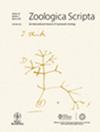Peeking back in time: Novel insights into the evolutionary relationships of diplommatinids (Caenogastropoda, Cyclophoroidea) from around Australia
IF 2
2区 生物学
Q2 EVOLUTIONARY BIOLOGY
引用次数: 0
Abstract
Based both on published GenBank DNA sequences and newly produced sequences, I have assembled the largest multi‐loci sequence dataset of the Diplommatinidae to date to investigate their evolutionary history. The focus of this study is on the diverse genus Palaina, which is represented by new sequences of its type species as well as additional samples from Timor and the Solomon Islands. In addition, the type species of Palmatina from Norfolk Island is also included. A relaxed molecular clock hypothesis is presented that incorporates several calibration points based on fossils or on previously published age estimates for major clades. Accordingly, the Sundaland diplommatinids Plectostoma, Opisthostoma, Arinia and Diplommatina are of considerable evolutionary antiquity, each likely having originated during the Cretaceous or early Paleogene at the latest. The Palaina sensu lato main clade was found to be the sister of all other diplommatinids included in the tree and has also diverged during the late Cretaceous. Palaina as currently delineated is rendered non‐monophyletic by the radiations of Hungerfordia and Eupalaina, which are endemic to the archipelago of Palau, as well as Palmatina from Norfolk Island.回溯时间:对澳大利亚各地双足目(Caenogastrododa,Cyclophoidea)进化关系的新见解
基于已发表的GenBank DNA序列和新产生的序列,我组装了迄今为止最大的双壳虫科多基因座序列数据集,以研究它们的进化史。本研究的重点是Palaina属的多样性,该属以其模式物种的新序列以及来自帝汶和所罗门群岛的额外样本为代表。此外,还包括来自诺福克岛的棕榈属模式种。提出了一种松弛的分子钟假说,该假说结合了基于化石或先前发表的主要分支的年龄估计的几个校准点。因此,Sundaland diplommatinids Plectomotoma、Opisthostoma、Arinia和Diplommantina具有相当古老的进化史,每一种都可能最晚起源于白垩纪或古近纪早期。Palaina sensu lato主支被发现是该树中所有其他双壳目的姐妹,也在白垩纪晚期分化。帕劳群岛特有的Hungerfordia和Eupalaina以及诺福克岛的Palmatina的辐射使目前划定的Palaina成为非单系。
本文章由计算机程序翻译,如有差异,请以英文原文为准。
求助全文
约1分钟内获得全文
求助全文
来源期刊

Zoologica Scripta
生物-动物学
CiteScore
5.60
自引率
0.00%
发文量
52
审稿时长
>12 weeks
期刊介绍:
Zoologica Scripta publishes papers in animal systematics and phylogeny, i.e. studies of evolutionary relationships among taxa, and the origin and evolution of biological diversity. Papers can also deal with ecological interactions and geographic distributions (phylogeography) if the results are placed in a wider phylogenetic/systematic/evolutionary context. Zoologica Scripta encourages papers on the development of methods for all aspects of phylogenetic inference and biological nomenclature/classification.
Articles published in Zoologica Scripta must be original and present either theoretical or empirical studies of interest to a broad audience in systematics and phylogeny. Purely taxonomic papers, like species descriptions without being placed in a wider systematic/phylogenetic context, will not be considered.
 求助内容:
求助内容: 应助结果提醒方式:
应助结果提醒方式:


